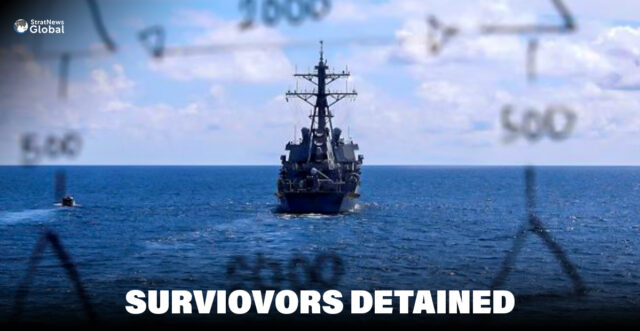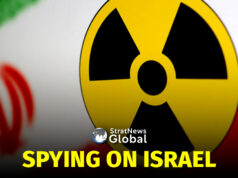Two survivors rescued from a suspected drug vessel struck by U.S. forces in the Caribbean are now being held aboard an American Navy warship, according to three sources familiar with the situation. The strike, which killed two others on board, has drawn attention to the latest U.S. operation in the region.
The disclosure, which has not been previously reported, raises the possibility that the survivors from Thursday’s strike are the first prisoners of war in a conflict declared by President Donald Trump against a “narcoterrorist” threat he says is emanating from Venezuela.
The Pentagon did not immediately respond to a request for comment. Trump told reporters that the strike was against “a drug-carrying submarine built specifically for the transportation of massive amounts of drugs.” He did not comment on how many were killed or survived the strike.
One of the sources said the vessel struck on Thursday moved below the water and was possibly a semi-submersible, which is a submarine-like vessel used by drug traffickers to avoid detection.
Five sources familiar with the matter said the U.S. military staged a helicopter rescue to pick up the survivors of the attack and bring them back to the U.S. warship.
Strikes Against Suspected Drug Vessels
Prior to Thursday’s operation, U.S. military strikes against suspected drug boats off Venezuela had not left any known survivors and videos presented by the Trump administration showed vessels being destroyed.
The Trump administration has said the previous strikes killed 27 people, raising alarms among some legal experts and Democratic lawmakers, who question whether they adhere to the laws of war.
The strikes come against the backdrop of a U.S. military buildup in the Caribbean that includes guided missile destroyers, F-35 fighter jets, a nuclear submarine and around 6,500 troops as Trump escalates a standoff with the Venezuelan government.
On Wednesday, Trump disclosed he had authorized the Central Intelligence Agency to conduct covert operations inside Venezuela, adding to speculation in Caracas that the United States is attempting to topple Venezuelan President Nicolas Maduro.
In a letter this week to the United Nations’ 15-member Security Council, Venezuela’s U.N. Ambassador Samuel Moncada asked for a U.N. determination that the U.S. strikes off its coast are illegal and to issue a statement backing Venezuela’s sovereignty.
Earlier this month, the Pentagon disclosed to Congress in a notification that Trump has determined the United States is engaged in “a non-international armed conflict.”
U.S. Military Activities
The document aimed to explain the Trump administration’s legal rationale for unleashing U.S. military force in the Caribbean.
Less than a week ago, the Pentagon announced its counter-narcotics operations in the region would not be led by the Miami-based Southern Command, which oversees U.S. military activities in Latin America.
Instead, the Pentagon said a task force was being created that would be led by II Marine Expeditionary Force, a unit capable of rapid overseas operations that is based at Camp Lejeune in North Carolina.
That decision came as a surprise to U.S. military-watchers, since a combatant command like Southern Command would normally lead any high-profile operations.
On Thursday, Defence Secretary Pete Hegseth said the admiral who leads U.S. Southern Command will step down at the end of this year, two years ahead of schedule, in a surprise move.
(With inputs from Reuters)





